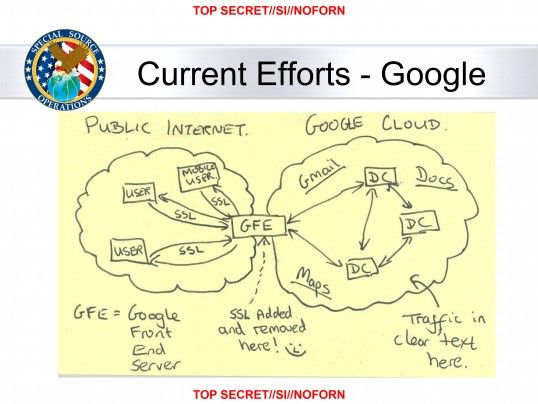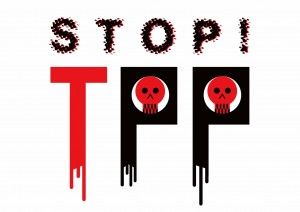Cross posted from The Stars Hollow Gazette
“We don’t have a domestic spying program.” That was the statement made by President Barack Obama on the “Jay Leno Show” on August 6, 2013 in the aftermath of the revelations by whistleblower Edward Snowden. We know now that there was no truth in that. We know, through the NSA program called “PRISM,” the NSA had been collecting internet data since 2007, including encrypted communications, from the tech giants, such as Google, Yahoo and Verizon, under Section 702 of the FISA Amendments Act of 2008. That’s the one that Obama said he would filibuster, then voted for with the promise of fixing it later.
The latest revelation is the NSA went beyond PRISM’s front door approach and behind the back of Google and Yahooo to infiltrate links to their data centers world wide. This newest document from Edward Snowden’s stash of NSA files exposed a program called MUSCULAR that was jointly operated with the NSA’s British counterpart, GCHQ. As it was reported by Barton Gellman and Ashkan Soltani at The Washington Post, through this program they secretly broke into the main communication links that connect Yahoo and Google around the world enabling them to “collect at will from hundreds of millions of user accounts, many of them belonging to Americans.
According to a top-secret accounting dated Jan. 9, 2013, the NSA’s acquisitions directorate sends millions of records every day from internal Yahoo and Google networks to data warehouses at the agency’s headquarters at Fort Meade, Md. In the preceding 30 days, the report said, field collectors had processed and sent back 181,280,466 new records – including “metadata,” which would indicate who sent or received e-mails and when, as well as content such as text, audio and video.
The NSA’s principal tool to exploit the data links is a project called MUSCULAR, operated jointly with the agency’s British counterpart, the Government Communications Headquarters . From undisclosed interception points, the NSA and the GCHQ are copying entire data flows across fiber-optic cables that carry information among the data centers of the Silicon Valley giants. [..]
Intercepting communications overseas has clear advantages for the NSA, with looser restrictions and less oversight. NSA documents about the effort refer directly to “full take,” “bulk access” and “high volume” operations on Yahoo and Google networks. Such large-scale collection of Internet content would be illegal in the United States, but the operations take place overseas, where the NSA is allowed to presume that anyone using a foreign data link is a foreigner.
Outside U.S. territory, statutory restrictions on surveillance seldom apply and the FISC has no jurisdiction. Senate Intelligence Committee Chairman Dianne Feinstein (D-Calif.) has acknowledged that Congress conducts little oversight of intelligence-gathering under the presidential authority of Executive Order 12333, which defines the basic powers and responsibilities of the intelligence agencies.
Needless to say the news that the NSA can collect information sent by fibre optic cable between the two tech giants infuriated them:
In a statement, Google’s chief legal officer, David Drummond, said the company was “outraged” by the latest revelations.
“We have long been concerned about the possibility of this kind of snooping, which is why we have continued to extend encryption across more and more Google services and links, especially the links in the slide,” he said.
“We do not provide any government, including the US government, with access to our systems. We are outraged at the lengths to which the government seems to have gone to intercept data from our private fiber networks, and it underscores the need for urgent reform.”
Yahoo said: “We have strict controls in place to protect the security of our data centers, and we have not given access to our data centers to the NSA or to any other government agency.”
It was this slide from the NSA presentation on “Google Cloud Exploitation,” that caused two engineers with close ties to Google exploded in profanity when they saw the drawing.

Click on image to enlarge.
The tech giants are now calling for real reforms of the NSA. In a letter sent to the Senate Intelligence Committee, chaired by Senator Dianne Feinstein (D-CA), they called for passage of the USA Freedom Act a bill sponsored by Democrat senator Patrick Leahy and Republican congressman James Sensenbrenner that would end the bulk collection of data from millions of Americans and set up a privacy advocate to monitor the Fisa court, which oversees the NSA’s US activities.
“Recent disclosures regarding surveillance activity raise important concerns in the United States and abroad. The volume and complexity of the information that has been disclosed in recent months has created significant confusion here and around the world, making it more difficult to identify appropriate policy prescriptions,” the letter states.
“Our companies have consistently made clear that we only respond to legal demands for customer and user information that are targeted and specific.
“Allowing companies to be transparent about the number and nature of requests will help the public better understand the facts about the government’s authority to compel technology companies to disclose user data and how technology companies respond to the targeted legal demands we receive,” they write. [..]
“We urge the administration to work with Congress in addressing these critical reforms that would provide much needed transparency and help rebuild the trust of Internet users around the world,” the letter said.
The lack of credibility that this administration and congress has on this issue is eclipsed only by the enormity of the Grand Canyon. The sham House Intelligence Committee led by chief NSA apologist Rep. Mike Rogers featured inveterate liars NSA boss General Keith Alexander and Director of National Intelligence James Clapper, along with Deputy Attorney General James Cole and number 2 guy at NSA Chris Inglis who were tossed easy questions. When push back from Democratic committee members came, Rogers interrupted, incredibly suggesting that they should just shut up if they’re going to say they weren’t informed:
(Rep. Adam) Schiff quite reasonably, appeared to take offense to this, and challenged Rogers, asking for more details as to when and how the Committee was told about spying on foreign leaders. Rogers without actually answering the question kept “warning” other members not to say something about this. Schiff broke in again (with Rogers trying to stop him from talking) to ask if the Committee was directly informed about this or if it was just a giant data dump of information that he would have had to go through carefully to find out who they were spying on. Rogers again refused to answer the question, and again hinted that those who put in the “effort” would have known about this — and then flat out cut off Schiff [..]

 The government shutdown and the threat of default on debt payments kept President Barack Obama from attending the recent round of talks on the
The government shutdown and the threat of default on debt payments kept President Barack Obama from attending the recent round of talks on the